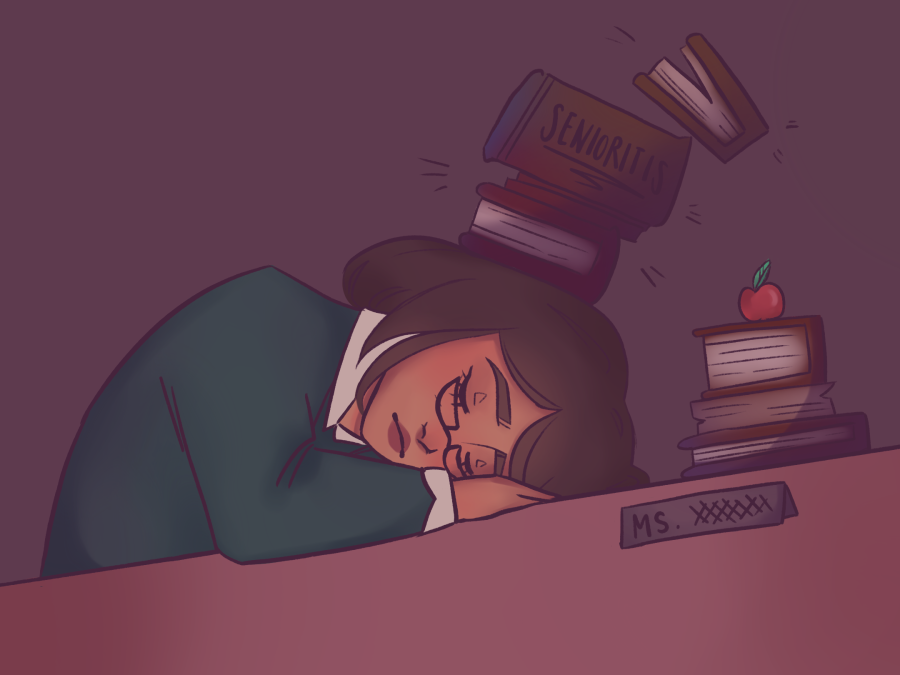As the 9 a.m. bell that once brought in the majority of class rings, AP Literature & Composition and Humanities teacher Mimi Park sighs as she marks yet another student absent. Her classroom is a ghost town as many of her seniors have succumbed to senioritis –– the decline in motivation as students near the end of high school. But as the number of absent students in her class increases, Park is not alone in being forced to confront the reality of this all-too-familiar phenomenon.
Park said overcoming senioritis is a give-and-take situation for both the teacher and student.
“It’s frustrating when I have students who are falling behind because, as a teacher, I can help them make it across 95% of the way, but I still need that 5% from them,” Park said. “We want to make sure that they’re going off to college or other post-secondary plans and don’t want them to have to do summer school to graduate.”
Park also said the school can play a part in deterring senioritis by making consequences more strict.
“There’s a huge correlation between an excessive number of absences and tardies and work completion,” Park said. “If we kept track of (attendance) a bit better, maybe it would encourage students to try to make it to class more frequently. It gives me, as a teacher, a chance to talk to them in person and help them make a plan.”
Although Park’s AP Literature & Composition is an elective English class, Living Skills is a graduation requirement students often take their senior year. Living Skills teacher Alyssa Bond said the need to pass the class in order to graduate lessens the effect of senioritis in that class.
“I don’t have to do a lot to remind students to get their stuff done so they can pass the class and graduate,” Bond said. “They have to take the class, but they also have to pass it so there is still that motivating factor to at least do well.”
However, Bond said she still notices senioritis in her students and changed her curriculum as a result.
“We have sex education and drug and alcohol curricula typically towards the end of the semester when we’ve built really good relationships with our classes,” Bond said. “But because of senioritis and fatigue for all grades in the class, we moved it up so there’s more engagement.”
Although Park said senioritis is more prominent in her second semester classes, she doesn’t change her lesson plans to accommodate affected students and instead gives repeated reminders to stay on top of their work.
“When we get to the beginning of second semester, I do more frequent check-ins, especially if I feel like a student is starting to fall behind because I know it becomes really hard to make all of that up later,” Park said.
English and Humanities teacher Lizzie DeKraai also said she doesn’t change her Humanities curriculum for seniors but does provide resources for students to catch up on missed material.
“I refuse to change my lesson plans because students are not showing up because it is not fair to the students that are there to do nothing for the first 20-30 minutes of class,” DeKraai said. “However, all of the lectures are recorded. There’s resources online so kids who choose to not come to class can get caught up.”
But even with her extra effort to accommodate Humanities students missing class, DeKraai said the lack of attendance impacts other students.
“There was one day that I had 12 out of 32 present at the bell,” DeKraai said. “For work periods, it was frustrating because you’re losing opportunities to get help from me and from your classmates, and that’s protected time that I’m sacrificing by not teaching something to you to help you with your work.”
Park said the difference in workload between her AP Literature and Humanities class may lead to different motivating factors that affect the magnitude of senioritis.
“Senioritis didn’t hit very hard for my seniors in AP Lit because they knew the AP exam was approaching,” Park said. “However, in Humanities, it’s more difficult because there isn’t a major AP exam at the end of it that’s looming over students. It becomes much easier to push aside the work when there’s tests (in other classes) to prepare for.”
No matter the class, Park said students should figure out a method that allows them to finish their work.
“What works is different for everyone, but communication is the biggest thing,” Park said. “If (you’re) falling behind or feeling reluctant to go to class, talk to somebody who can help, like a TA, teacher or counselor. But don’t try to do it alone.”
Along with finding ways to deal with fatigue, DeKraai said high school is a time to build good habits for the future.
“You will never regret going to class,” DeKraai said. “Learn, talk to your friends and get some work done. This is just life; you have to show up and do the things that you don’t want to do in service of higher desires or goals.”
Park said she hopes seniors won’t let senioritis undermine the hard work they’ve accomplished throughout their four years.
“It’s like someone who just ran a marathon and is 100 yards from the finish line deciding they’re going to stop,” Park said. “You’ve come so far, so don’t let that effort be wasted.”



